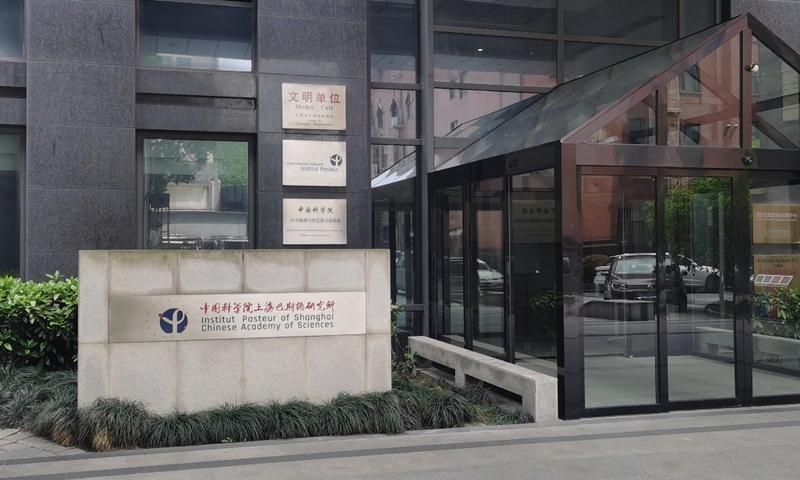China still open to intl cooperation on science research say virologists, refuting hype over French exit from Shanghai Pasteur institute

Institute Pasteur of Shanghai
Chinese virologists on Monday stressed their country's openness and sincerity in international cooperation on scientific research in a refute to some Western claims that the news that French Pasteur Institute will cease to co-lead an institute in Shanghai means "the end of an era of scientific partnership" in China's scientific research field.
The Nature has learnt that the influential Pasteur Institute in Paris has suspended its partnership with the Chinese Academy of Sciences (CAS), Beijing, and would cease to co-lead the Institute Pasteur of Shanghai.
The Institute Pasteur of Shanghai was established in 2004 as a scientific partnership between France and China, focused on infectious-disease research.
Nature cited a spokesperson for the Pasteur Institute as saying that the organization decided to cease co-leading the Shanghai facility with CAS in December 2022. "This choice was made in order to begin a new cycle of conversations for improving the relationship between the two organizations and finding a more productive way to work together," they said.
The Pasteur Institute is no longer involved in the activities of the Shanghai institute, which is now being supervised by CAS, and the Shanghai facility's name will change, the spokesperson said.
A spokesperson for CAS, quoted by Nature, said the two institutes have maintained a long-term and friendly partnership, and they are "actively exploring new collaboration options, rather than the form of 'a joint institute,' to better tackle global challenges in infectious-disease research."
Lan Ke, director of the State Key Laboratory of Virology at Wuhan University, who was the deputy director at the Shanghai institute between 2011 and 2016, told the Global Times that the Chinese government continues to encourage international scientific collaboration, which is still very active in the field of life sciences and necessary for infectious-disease research.
Lan said the Institute Pasteur of Shanghai used to be regarded as a model of cooperation and exchange in the field of science and technology in China. The establishment of such an institution not only has special symbolic significance, but also has rich academic output. It can cultivate many complex and innovative talents in the fields of etiology, immunology and vaccinology, Lan noted.
Although both the CAS and the Pasteur Institute in France expressed their friendly attitude to the decision to stop co-leading the Shanghai facility as well as their willingness to explore new collaboration options over the cooperation, some media and scholars are still trying to "over-interpret" the incident.
Alice Hughes, a conservation biologist at the University of Hong Kong, who collaborates with researchers at the Shanghai institute, said in an interview with French media that this could signal that China's "era of internationalization" in research is over. Although foreign researchers are welcome at Chinese research institutions, they might not be able to co-lead them, Hughes said.
The interpretation is absurd, Lan said.
"As far as I know, both the CAS and the Pasteur Institute in France had good intentions to run this institute well," Lan said. However, due to some management problems caused by a few individuals, the two sides stopped the co-leading cooperation, but this is just an individual case, said Lan, denying that the news reflected a broader trend.
The latest development between the French and Chinese facilities should not be over-interpreted nor be used to bad-mouth the trend of international cooperation of Chinese research institutions, Lan said.
The Chinese government continues to encourage international scientific cooperation, and international cooperation in China's life sciences remains active, he said, noting that for many areas of research, especially infectious diseases, international cooperation is essential.
In the future, China will further expand international cooperation in the field of scientific research. China's attitude towards this is open and candid, the Chinese virologist stressed.
Another Chinese virologist Yang Zhanqiu, deputy director of the pathogen biology department at Wuhan University, has similar views with Lan.
Yang told the Global Times on Monday that in the post-pandemic era with COVID restrictions mostly lifted across the world, the international cooperation on scientific research, especially offline co-work, is expected to recover.
Yang said symposiums and collaboration on virology research are held regularly and that he has kept constant communication with foreign fellows.
China has made clear its attitude on international cooperation in the field of scientific research on many occasions. At the third group study session of the Political Bureau of the 20th CPC Central Committee last month, Party and state leaders stressed that international cooperation, opening-up and sharing are needed more than ever for humanity to tackle common development challenges, the Xinhua News Agency reported.
It is necessary to build a platform for international cooperation on basic research, establish a global scientific research fund, increase the opening-up of national sci-tech programs to the outside world, according to the session.

